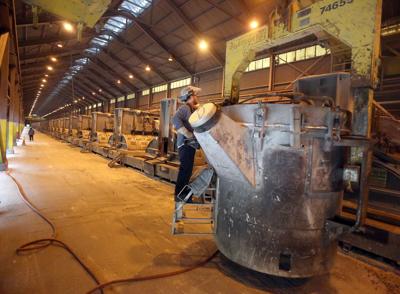Goose Creek’s city leaders are in favor of holding a referendum on the question of whether the city should be authorized to enter into the electric utility business.
According to City Administrator Jake Broom, Century Aluminum, a local aluminum smelting company that employees 300 people, has informed the city that the high cost of purchasing power is threatening the future of Century Aluminum’s operations. The company is located on 5,000 acres just outside the current city limits. It shuttered half of the facility operations in December 2015 due to high power costs.
Century Aluminum buys 75 percent of its power on the open market and 25 percent from Santee Cooper. According to Century Aluminum, the power it purchases from Santee Cooper is nearly twice as expensive as the portion purchased on the open market on a per-megawatt hour basis.
Broom said should the referendum pass, all costs associated with the project will be recovered by the sale of electricity- no taxpayer money will fund it.
“We’ll calculate exactly what it will cost us to operate a utility and we’ll add that amount to the rate we charge Century and any other future customer(s),” Broom said. “It will pay for itself, just like the water utility we’ve operated successfully since the mid-1990’s. Whatever it costs us to buy the electricity and get it to the customer will be covered by what the customer pays for the electricity.”
The scope of the city’s municipal electric utility would be limited; it would only serve customers in the Annexed Area. Any customer currently served by Berkeley Electric Cooperative (BEC) would remain a customer of BEC.
Century’s existing contract with Santee Cooper expires at the end of 2020, so the earliest the city would begin selling electricity to Century Aluminum is at the start of 2021.
City Council members have been considering the option of a municipal electric utility for the past eight months, according to Goose Creek Mayor Greg Habib.
During the city council meeting on Tuesday, Habib said based on the information city leaders received from various consultants, that the city has a legal path forward to provide electricity to the 5,000 acres held by Century Aluminum.
“We’re the 8th largest city in South Carolina and we’re well equipped to perform anything we need to do for the citizens of our city,” Habib said. “If the referendum passes, the following will take place; 300 people- many of them live in the City of Goose Creek- will go back to work at Century Aluminum. Our tax base expands significantly, every dollar we collect from this project will be a dollar we do not need to collect from the residents or other businesses in our city.”
Additionally, the city will be able to hire more police officers and firefighters and expand recreational opportunities for residents- without raising taxes- according to Habib.
Broom explained that upon annexation, Century Aluminum would begin paying property taxes and a business license fee to the city. Based on the company’s assets and gross revenues, these tax streams represent large revenue opportunities for the city. In addition, to the extent other industrial customers locate in the Annexed Area, these new businesses would also pay city property taxes and a city business license fee.
The city-owned electric utility would purchase power on the open market through a competitive bidding process. It would enter into a binding purchased power utility agreement with Century Aluminum for an agreed-upon amount of time to purchase the electricity. The rate paid by Century Aluminum is anticipated to cover the cost of the purchased power plus all overhead, maintenance, capital, transmission and other expenses incurred by the City.
Century Aluminum has told city officials that lower power costs would allow it to reinvest in the facility and reopen the shuttered half of its plant. The initial investment to reopen the full plant is estimated to be approximately $54 million. They would also hire an estimated 300 additional people once that part of the plant came back online.
Formation of the municipal electric utility, which provides the incentive for annexation of the annexed area, fulfills city council’s goal of growing the city’s boundaries and creating future economic development opportunities within the city, according to Broom. It also gives the City the chance to guide any potential development of the property using zoning.
City Council members voted unanimously on Tuesday to approve the first reading of a resolution ordering a referendum. Pending adoption by the city council and subsequent approval by the County Election Commission, the election is anticipated to be held on Dec. 3.
According to the Municipal Association of South Carolina, there are 21 municipal electric utilities in the state.







